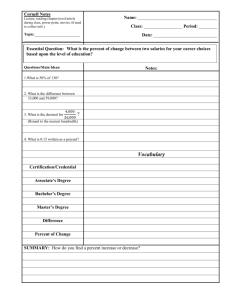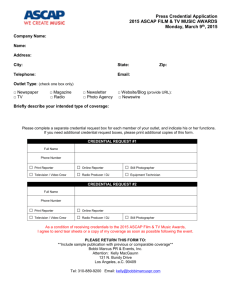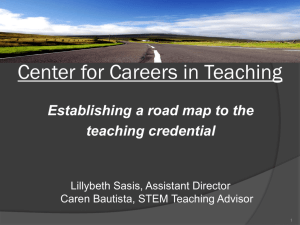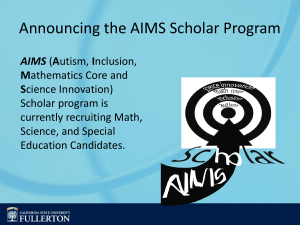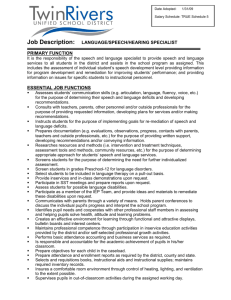Teacher Preparation at Santa Rosa Junior College
advertisement
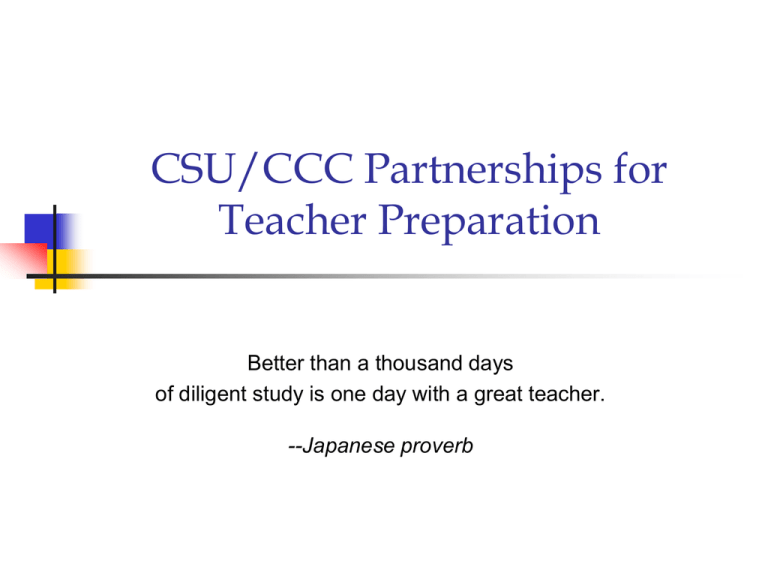
CSU/CCC Partnerships for Teacher Preparation Better than a thousand days of diligent study is one day with a great teacher. --Japanese proverb The Imperative California will need 195,000 new K-12 teachers by 2014 Enrollments continue to grow Over 44% of teachers will be eligible to retire within 10 years Growth in vocational education Severe shortages exist in math, science, special education, vocational education and those prepared to meet the needs of diverse populations Did you know? The majority of public school teachers begin their education at a community college. Types of K-12 Teaching Credentials Multiple Subject Single subject For elementary school teachers For middle school or high school teachers Education Specialist For special education teachers Requirements for all K-12 credentials Bachelor’s degree Complete a U.S. Constitution course Meet a Basic Skills Requirement Pass a subject matter test Professional preparation (credential program, including student teaching) Multiple Subject Credential Bachelor’s degree in Liberal Studies or other multiple subject program such as SSU’s American Multicultural Studies (AMCS) Chicano and Latino Studies (CALS) Environmental Studies and Planning (ENSP) Hutchins School of Liberal Studies Basic Skills: Pass the CBEST Subject matter exam: CSET Multiple Subjects Additional requirements: a reading instruction course pass Reading Instruction Competence Assessment (RICA) a computer technology course Single Subject Credential Basic Skills: CBEST Subject matter preparation Bachelor’s degree: state-approved program of study in the subject: or Subject matter exam: CSET Single Subject Agriculture, Art, Business, English, Health, Home Economics, Industrial and Technology Education, Languages Other Than English, Mathematics, Music, Physical Education, Science (Biology, Chemistry, Geoscience, Physics), Social Science Additional requirements: a developing English language skills course a computer technology course Education Specialist Credential Professional preparation: Education Specialist Credential program in: mild/moderate or moderate/severe disabilities deaf/hard-of-hearing physical/health impairments visual impairments early childhood special education Basic Skills: CBEST Subject matter: CSET or complete approved subject matter program Additional requirements: a developing English language skills course pass the Reading Instruction Competency Assessment (RICA) Teaching Middle School Single subject credential, or Multiple subject credential, plus a supplementary authorization in a single subject Other Routes to Credentials “Blended” or “Integrated” Teacher Preparation Program: Combine subject matter preparation with teacher preparation classes Allows students to complete BA and credential concurrently in a shorter timeframe Ideal for “early deciders” who know they want to teach as early as their freshman year Most CSU campuses have integrated programs for multiple subject; some have single subject or special education Tips for K-12 Teacher Prep Suggest taking CBEST as soon as possible after completing quantitative reasoning (Math) and English composition (English 1A) Tell students to get early field experience; available through CSU or CCC internships Recommend students keep their syllabi and assignments as many CSU’s require a portfolio Teaching in CTE (Career Technical Education) Middle/High Schools and Regional Occupation Programs Earn a degree/credential in one of a number of career/ technical education programs Use industry experience to obtain a Designated Subjects Credential to teach one specific vocational subject Teaching in CTE (Career Technical Education) Community Colleges Bachelor’s degree and two years of industry experience or Associate’s degree and six years of industry experience or Other equivalent experience where allowed Academic Teaching in Community Colleges Master’s degree or higher in the subject or designated related subjects or Documentation of “Equivalency” through education and/or experience Teaching in a University PhD in discipline subject for tenuretrack positions as assistant professor or professor Master’s degree for some temporary “lecturer” positions Financial Aid for Teachers There are resources available to help students pay for teacher preparation APLE (Assumption Program of Loans in Education) Pell Grants Cal-Grant A & B with 5th-year benefits for teacher prep CCC Transfer Entitlement Award FFEL (Federal Family Education Loan) & Direct Loan Troops to Teachers Scholarships There are additional benefits available after they become a teacher Information Resources Teach California EdJoin Teacher preparation Information www.teachcalifornia.org Job seeking assistance www.edjoin.org Transfer Center/Teacher Academy Bussman Hall (room 1434); 527-4874 Monday-Thursday 8 a.m. to 5 p.m.; Friday 8 a.m. to 12 noon; Wednesday evening 5-7 p.m. www.santarosa.edu/transfer The Hutchins School of Liberal Studies at Sonoma State University Teacher preparation for Multiple Subject and Special Education BA + 5th year credential Blended BA and credential concurrently Student-centered learning in small classes Self-contained Liberal Studies program Goals of Teacher Preparation at SRJC Recruit diverse students into the field of teaching Expand the number of successful transfers of well-prepared students to university teacher education programs Assist students in completing their degrees in a timely manner The Teacher Academy at SRJC Recruitment and outreach Counseling Articulated courses needed to prepare for teaching at all levels Education classes through SSU Internships in public school settings Preparing for Classroom Diversity “Issues in Diversity” Child 68 – a 3-unit SRJC course Augmented by SRJC’s CI 55 for 50 hours of classroom experience “Teaching in a Changing World” Education 250 – a 3-unit SSU course Students cross-enroll at SSU CSU tuition waived 30 hours of classroom experience Thank You Donna Garbesi Hutchins/School of Education Sonoma State University donna.garbesi@sonoma.edu Roberta Delgado Transfer Center Counselor/Director Santa Rosa Junior College rdelgado@santarosa.edu
